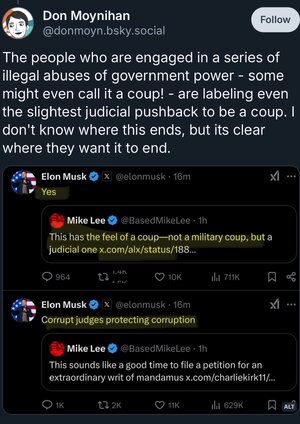Continued
“… We take the extraordinary step of writing this piece because we are alarmed about the risks of arbitrary and capricious political control of federal payments, which would be unlawful and corrosive to our democracy.
A key component of the rule of law is the executive branch’s commitment to respect Congress’s power of the purse: The legislative branch has the sole authority to pass laws that determine where and how federal dollars should be spent.
The role of the Treasury Department — and of the executive branch more broadly — is not to make determinations about which promises of federal funding made by Congress it will keep, and which it will not.
As Justice Brett Kavanaugh of the Supreme Court
previously wrote, “Even the president does not have unilateral authority to refuse to spend the funds.”
Chief Justice John Roberts agrees: He
wrote that “no area seems more clearly the province of Congress than the power of the purse.”
During our collective 18 years at the helm of the Treasury, we never were asked to stop congressionally appropriated funds from being paid out in full. Not since the Nixon administration has this type of executive action been contemplated. At that time, the Supreme Court ruled unanimously that the president did not have the power to withhold federal funds that Congress had authorized.
…
No Treasury secretary in his or her first weeks in office should be put in the position where it is necessary to reassure the nation and the world of the integrity of our payments system or our commitment to make good on our financial obligations.
Secretary Scott Bessent has had to do just that, and we were comforted to see the agency
commit to Congress that any recent access to Treasury’s payment systems “is not resulting in the suspension or rejection of any payment instructions submitted” to the federal government. When he has been asked — repeatedly — if Treasury has tried to block any federal payments, he has stated unequivocally that “
we have not.”
… But even more than the importance of making good on particular commitments is the importance of making good on the principles that this country stands for. We have during our service in the Treasury Department faced moments of crisis, when the specter of an American default loomed.
Any hint of the selective suspension of congressionally authorized payments will be a breach of trust and ultimately, a form of default.
And
our credibility, once lost, will prove difficult to regain.”
——
That’s one thing that a lot of the laissez faire observers of what the Trump Administration is doing don’t seem to get — once the reputational and foundational damage is done, it doesn’t just come back if we change course in response to a court order or just by someone talking Trump out of it.
It takes years and decades to build good will and trust. It only takes a single moment to destroy them. It is easy for an arsonist to toss a match and watch it burn. It can take communities years, if ever, to recover, and often the original community is displaced by a very different community in the aftermath.


